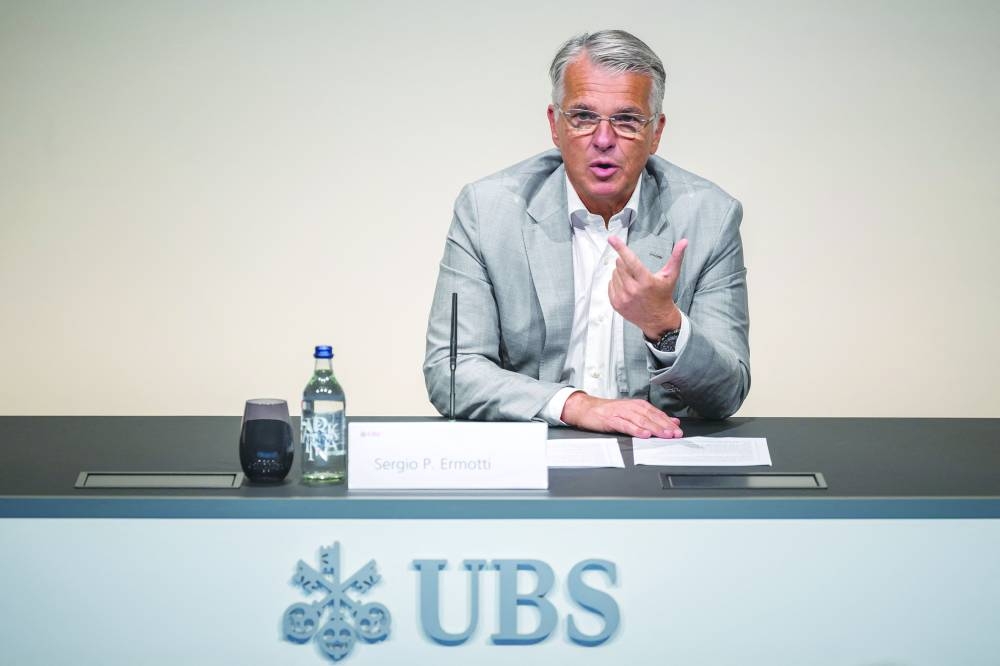UBS Group embarked on a sweeping plan to cut more than $10bn in costs, saying on Thursday it will axe 3,000 jobs in Switzerland alone after it took over its stricken rival Credit Suisse.
The plan to cut roughly one in 12 Swiss jobs gives a glimpse of the scale of shake-up at the newly forged banking giant, as it grapples with the task of swallowing a competitor that unravelled after panicked customers withdrew tens of billions.
The initial round of job cuts follows a decision by the globe’s biggest wealth manager to absorb Credit Suisse’s local arm — a solid profit-maker that last year was the only Credit Suisse division in the black — rather than spin it off, which UBS had also considered.
“Our analysis clearly shows that a full integration is the best outcome for UBS... and the Swiss economy,” Chief Executive Sergio Ermotti said.
He wrote in a memo to staff that 3,000 Swiss jobs would go, while more people would leave of their own accord, for example, through retirement. Globally, 8,000 Credit Suisse have already left over the first half of the year.
The prediction of over $10bn in cost-savings by end 2026 compares with an earlier estimate of $8bn by 2027.
The news lifted UBS shares, which were up more than 5% in early afternoon trade, hitting highs not seen since 2008, after the cuts were announced alongside the first financial results UBS published since the takeover, hastily arranged over one March weekend.
UBS also struck an optimistic note about its short-term outlook. The lender is seeing a pick up in sentiment among its rich clients and expects stronger financial markets to also boost the fees it earns, it said.
The decision to absorb Credit Suisse’s local operation is, however, contested in Switzerland. Proxy adviser Ethos, representing Swiss pension funds and foundations that owned stakes in both banks, said spinning off the Swiss bank instead would have avoided “a major systemic risk for Switzerland, an important negative impact on employment and issues for the fair competition.” Ethos has backed a class-action lawsuit seeking a better price from UBS for the takeover.
With Credit Suisse in Switzerland intact and independent, as some politicians had hoped, fewer jobs would have been threatened.
The biggest bank merger since the global financial crisis, orchestrated by the Swiss state to avert Credit Suisse’s collapse, created a group whose assets dwarf the economic output of the country, whose regulators had already struggled to control big lenders.
Although Switzerland bankrolled the rescue through guarantees and central bank funding, UBS has since dropped state support, leaving its politicians with little leverage to avert the cull ahead of national elections.
The cuts will be painful for Switzerland’s financial centre of Zurich, where the banks dominate the landscape. The Swiss Bank Employees Association said that the two banks’ 37,000 local staff should be treated fairly and equally.
The Swiss job cuts give a taste of more to come at the global bank, whose reach spans Wall Street to London.
Most savings are set to come from cutting staff and analysts have estimated between 30,000 and 35,000 jobs could go globally.
Analysts welcomed the announcement, although several sounded a note of caution. Jefferies described the integration of the two as “long, challenging and likely bumpy.
“The group remains a construction site,” said Deutsche Bank analysts.
The results also showed the difficulties UBS has had in persuading Credit Suisse’s wealthy customers to stay.
Keeping them is seen as key if UBS is to successfully pull off the Herculean deal.
Credit Suisse reported net asset outflows of 39bn Swiss francs ($44.4bn) in the second quarter, underscoring that the rescue has failed to stem the loss of confidence.
But UBS said the outflows had slowed down and reversed in June. UBS’s global wealth management reported net new money of $16bn.
The shotgun marriage to its fallen rival — the first-ever merger of two global systemically important banks — has created both opportunities and risks for UBS.
Analysts note that UBS acquired Credit Suisse for a song — just 3bn Swiss francs — but to make it work UBS must slash costs, shrink Credit Suisse’s investment bank, and keep its wealthy clients on board.
UBS booked net profit of $29bn for the second quarter. Group-wide UBS results include just one month of Credit Suisse earnings as the deal only closed in June.
The bumper profit results from a huge one-off gain that reflects how the acquisition costs were far below Credit Suisse’s value. It was somewhat under a consensus estimate of $33.45bn from a poll conducted by the bank.

UBS chief executive Sergio Ermotti speaks during a press conference on the first results of the Swiss giant banking UBS since it’s Credit Suisse merger in Zurich on Thursday. The plan to cut roughly one in 12 Swiss jobs gives a glimpse of the scale of shake-up at the newly forged banking giant, as it grapples with the task of swallowing a competitor that unravelled after panicked customers withdrew tens of billions.
